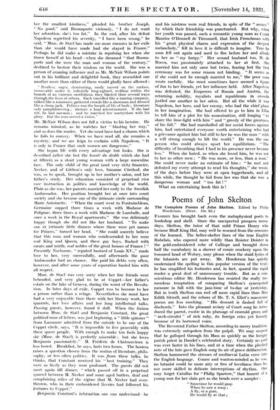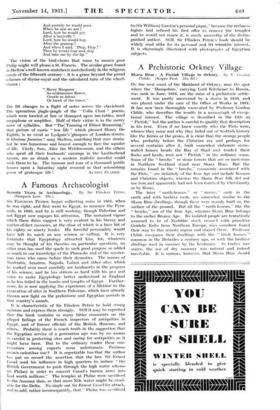Poems of John Skelton
The Complete Poems of John Skelton. Edited by Philip Henderson. (Dent. 10s. 6d.) FASHION has brought back even the metaphysical poets to bookshop and shelf. Since the unexpected prospers nowa- days, Skelton, the tutor of that mild Prince Henry who became Bluff King Hal, may well be rescued from the censures of the learned. The helter-skelter lines of the true English Rabelais, who capered more wildly than Roister Doister in the gold-embroidered robe of Calliope and brought down half the vocabulary in a shower of comic crockery upon the tonsured head of Wolsey, may please when the staid lyrics of the lutanists are put away. Mr. Henderson has quietly modernized the spelling in this popular version of the text: he has simplified his footnotes and, in fact, spared the rapid reader a great deal of unnecessary trouble. But as a con- scientious editor Mr. Henderson has resisted the really tre-
mendous temptation of comparing Skelton's syncopated measure in full with the jazz-time of to-day or yesterday.
But in truth Skelton can reel off more rapid lines than Miss
Edith Sitwell, and the echoes of Mr. T. S. Eliot's macaronis poems are less mocking. " His descant is dashed full of
dischords." Into the pleasant aviary of Court song he intro- duced the parrot, exotic in its plumage of emerald green and " neck-circulet " of rich ruby, its foreign cries yet homely because of its borrowed voice.
The Reverend Father Skelton, according to merry tradition, was extremely outspoken from the pulpit. We may suspect that he galloped through his Mass as quickly as the hungry
parish priest in Daudet's celebrated story. Certainly no poet was ever faster in his lines, and at a time when the plucked note of the lute gave English song its air of grave deliberation, Skelton hammered the stresses of mediaeval Latin verse into the English language. Coarse and wanton-minded as he was, no lutanist could be more airy or free of loveliness than he, nor more skilled in delicate interceptions of rhythm. One may forget Catullus for "Philip Sparrow," that lament of a young nun for her slain pet as she bends over a sampler :
" Sometime he would gasp When he saw a wasp ; A fly, or a gnat, He would fly at that ;
And prettily he would pant When he saw want !
Lord, how he would pry After a butterfly ! Lord, how he would hop After the grassop ! And when I said, Phip, Phip ! ' Then he would leap and skip And take me by the lip."
The vision of the bird-choirs that come to mourn poor Philip might well please a St. Francis. The secular grace found in Skelton's well-known snatches is matched only in the religious carols of the fifteenth century : it is a grace beyond the proud schemes of rhyme-royal and the calculated turn of the wheel- stanza : "Merry Margaret As midsummer flower, Gentle as falcon Or hawk of the tower."
The lilt changes to a flight of notes across the clavichord. The uproarious jingle-jangle of the " Colin Clout " poems, which were bawled at fair or thumped upon inn-tables, need megaphone or amplifier. Half of their virtue is in the merry noise of syllables. But "The: Tunning of Elinor Rumming," that picture of rustic " low life " which pleased Henry the Eighth, is as vivid as Lydgate's 'glimpses of London streets. 0 Gloriosa foenzina ! sang Skelton, matching that rare strain, but he was humorous and honest enough to face the squalor of life. Cicely, Sare, Alice the Welshwoman, and the others who spent all their husbands' earnings in the Leatherhead tavern, are as drunk as a modern realistic novelist could wish them to be. The rumour and roar of a thousand public houses upon a Saturday night resound in that astonishing



































 Previous page
Previous page